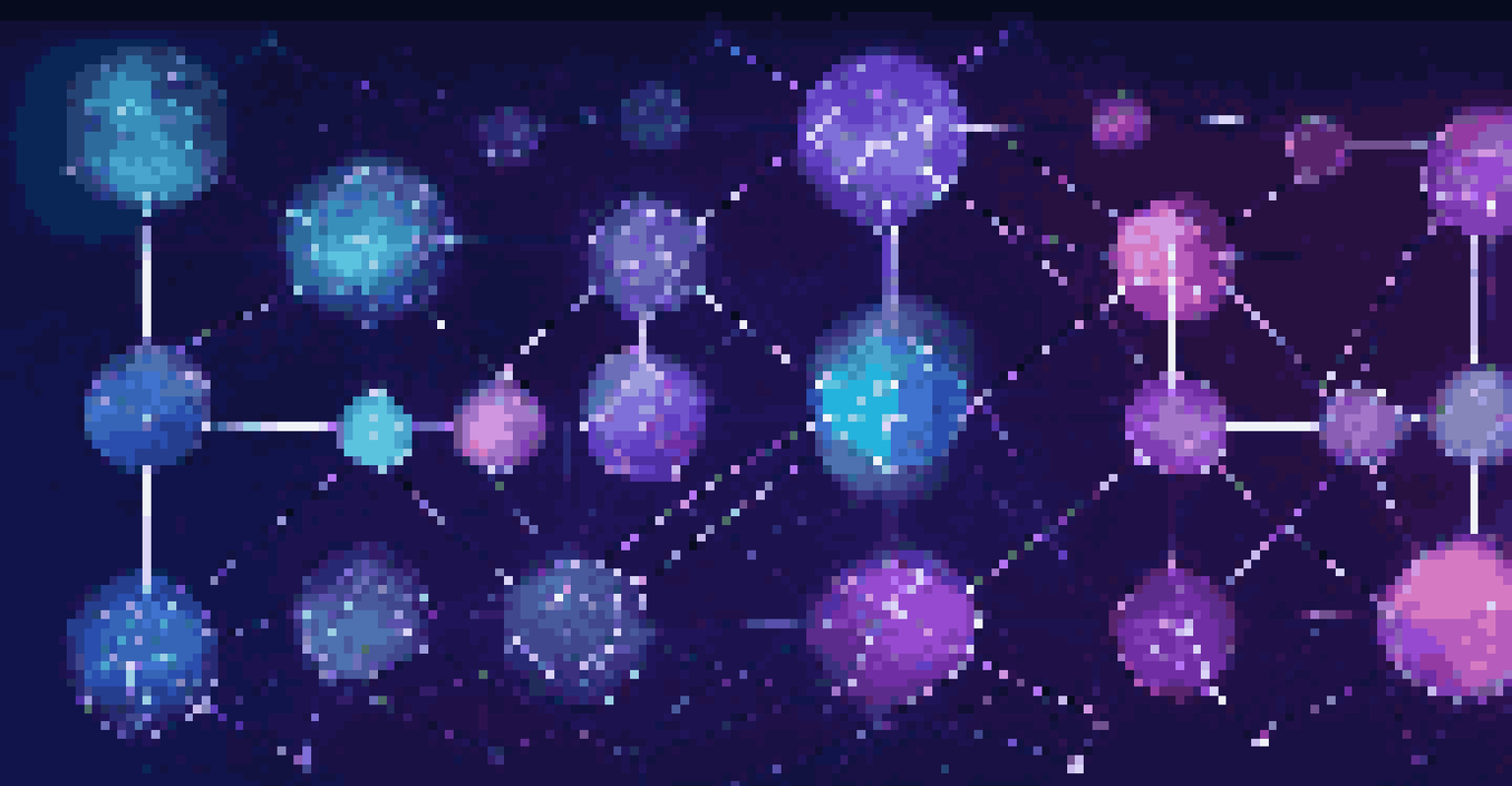The Future of Smart Contracts: Trends to Watch

Understanding Smart Contracts: A Quick Overview
Smart contracts are self-executing contracts with the terms directly written into code. They run on blockchain technology, which ensures transparency and security. Imagine them as vending machines: you input your requirements, and the machine delivers exactly what you paid for without needing a middleman. This automation streamlines processes and reduces the risk of human error.
Smart contracts are the digital equivalent of a handshake, allowing parties to engage in transactions without the need for intermediaries.
These contracts automatically execute when predetermined conditions are met, making transactions more efficient. For example, in a real estate deal, once the buyer transfers funds, the contract can automatically transfer ownership without further action required. This innovation not only saves time but also cuts down on costs associated with traditional contracts.
As we look to the future, understanding the foundational principles of smart contracts is essential. Their potential to revolutionize industries like finance, real estate, and supply chain management is immense. With that foundation, let's explore the exciting trends that are on the horizon for smart contracts.
Increased Adoption Across Industries
Smart contracts are gradually being embraced by various industries, from finance to healthcare. Companies are discovering that these contracts can automate processes, enhance security, and reduce paperwork. For instance, in the insurance sector, smart contracts can streamline claims processing, allowing for quicker payouts when certain conditions are met.

The increasing adoption is also driven by the need for efficiency and transparency. Businesses are looking for ways to improve operations, and smart contracts provide a solution that minimizes the need for intermediaries. As more companies witness the benefits firsthand, we can expect to see an accelerated shift towards widespread use.
Smart Contracts Streamline Processes
Smart contracts automate transactions by executing predefined conditions, eliminating the need for intermediaries and reducing costs.
This trend reflects a broader movement towards digital transformation across sectors. As organizations continue to innovate and integrate technology into their workflows, smart contracts will play a pivotal role in shaping future business practices.
Interoperability: Bridging Different Blockchain Networks
Interoperability refers to the ability of different blockchain networks to communicate and work together. As more companies adopt blockchain technology, the need for seamless interaction between various platforms becomes crucial. Imagine trying to send an email that can only be read by a specific email provider; it limits communication and collaboration.
The future of finance is decentralized, and smart contracts are the key to unlocking that potential.
Smart contracts that can operate across multiple blockchains will enable greater flexibility and functionality. For instance, a smart contract created on Ethereum might need to interact with another on Binance Smart Chain. Solutions like cross-chain bridges are being developed to facilitate these interactions, making smart contracts more versatile.
As interoperability improves, we will see an ecosystem where smart contracts can enhance processes across different industries and platforms. This advancement will pave the way for innovative applications that leverage the strengths of multiple blockchains.
Integration with Artificial Intelligence
The integration of artificial intelligence (AI) with smart contracts is a game-changer. By combining the decision-making capabilities of AI with the automation of smart contracts, we can create powerful tools that adapt based on real-time data. For example, an AI could analyze market trends to automatically adjust contract terms based on changing conditions.
This synergy can lead to more intelligent contracts that are not only self-executing but also capable of learning and evolving. Imagine a smart contract for a loan that adjusts interest rates based on the borrower's risk profile, determined by AI analysis. Such innovations could offer more personalized and efficient financial products.
Interoperability Enhances Flexibility
The ability for smart contracts to operate across different blockchain networks allows for greater functionality and innovative applications.
As AI continues to advance, its collaboration with smart contracts will unlock new possibilities for automation and efficiency across various sectors. This trend represents a significant leap towards more complex and responsive digital agreements.
Regulatory Developments and Compliance Challenges
As smart contracts gain traction, regulatory bodies are starting to take notice. The lack of clear legal frameworks can lead to uncertainty and potential compliance challenges for businesses using smart contracts. It's akin to navigating a new road without clear signposts; you might get lost or face unexpected hurdles.
Governments and regulatory agencies are working to establish guidelines to ensure that smart contracts comply with existing laws. This effort is crucial for fostering trust and encouraging wider adoption. As regulations evolve, businesses will need to adapt their smart contract practices to align with these new standards.
Navigating this regulatory landscape will require ongoing education and collaboration between tech innovators and lawmakers. The outcome of these discussions will shape the future of smart contracts and their role in the economy.
Enhanced Security Features on the Horizon
Security is a top concern for businesses considering the use of smart contracts. While blockchain technology offers inherent security features, vulnerabilities can still exist, especially if the code is poorly written. It’s like building a house; a solid foundation is essential, but if the construction is flawed, it might not withstand the test of time.
Future developments are focusing on enhancing security protocols for smart contracts. For instance, the introduction of formal verification methods can help ensure that contracts function as intended, reducing the likelihood of bugs or exploits. This approach provides an added layer of confidence for users and stakeholders.
AI Integration Transforms Contracts
Combining artificial intelligence with smart contracts creates adaptive agreements that respond to real-time data, enhancing efficiency.
As security measures improve, we can expect broader acceptance of smart contracts across various industries. Businesses will feel more empowered to leverage these tools, knowing that robust safeguards are in place to protect their interests.
The Role of Decentralized Finance (DeFi)
Decentralized finance (DeFi) is revolutionizing the way we think about financial services, and smart contracts are at the heart of this movement. DeFi platforms use smart contracts to create financial products that operate without traditional intermediaries like banks. Imagine being able to lend or borrow money directly with peers, facilitated by smart contracts that ensure fairness and transparency.
As the DeFi space continues to expand, we can anticipate the introduction of innovative financial instruments that utilize smart contracts. This might include things like decentralized insurance or automated investment strategies, making financial services more accessible to everyone. The potential to democratize finance is a significant draw for both users and developers.

The growing popularity of DeFi indicates a shift towards more user-centric financial solutions. As smart contracts evolve within this ecosystem, they will likely redefine how we interact with money and investments.
Looking Ahead: The Future of Smart Contracts
The future of smart contracts is bright, with numerous trends poised to shape their evolution. As we embrace increased adoption, interoperability, and AI integration, we can expect smarter, more efficient contracts that cater to diverse needs. It’s a bit like evolving from a basic calculator to a powerful computer; the possibilities expand exponentially.
Moreover, as regulatory frameworks solidify and security measures enhance, businesses will feel more confident in leveraging smart contracts. We are on the brink of a transformation that will redefine industries, streamline operations, and foster innovation.
Ultimately, the future will be defined by how we harness these advancements to create a more efficient, transparent, and equitable landscape. As we keep our eyes on these trends, one thing is clear: smart contracts are here to stay, and their potential is just beginning to be realized.